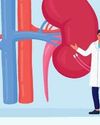
Phyllisa Deroze is no stranger to the benefits of gratitude in the face of adversity. “When you have diabetes, you’re constantly bombarded with opportunities to feel like a failure, which means you’re always dealing with negative feelings,” she says. Deroze, a global diabetes advocate and academic from Florida, was diagnosed with type 2 eight years ago – about two months after she lost her house and everything she owned in a tornado. She believes “embracing a spirit of gratitude can help you stay grounded and find positivity in a day filled with the opposite”.
It’s that ray of hope that’s made gratitude an anchor in Lauren Bongiorno’s life, too. Living with type 1 diabetes for almost 20 years has affected her mentally as much as physically. Yet through regular yoga practice, she’s learned that it’s healthy to acknowledge and sit with uncomfortable feelings, instead of pushing them away. The trouble occurs when those draining feelings linger.
“I know I need to make a shift, and coming back to gratitude is the fastest way to change your state of mind,” says Bongiorno, a virtual health coach and author of The Diabetic Health Journal.
It’s common sense that giving or receiving thanks can make you feel good. But as they say, the proof is in the pudding. A 2017 research review found that, psychologically, being grateful has been linked with enhanced feelings of vitality, hope, optimism and life satisfaction.
In one study from this review, people who wrote down the things they were grateful for reported fewer symptoms of physical illness, had better-quality sleep and spent more time exercising than those who thought about hassles or daily events.
This story is from the July - August 2020 edition of Diabetic Living Australia.
Start your 7-day Magzter GOLD free trial to access thousands of curated premium stories, and 9,000+ magazines and newspapers.
Already a subscriber ? Sign In
This story is from the July - August 2020 edition of Diabetic Living Australia.
Start your 7-day Magzter GOLD free trial to access thousands of curated premium stories, and 9,000+ magazines and newspapers.
Already a subscriber? Sign In

A whole new world
Being diagnosed with type 1 diabetes as an adult can be a challenging and confusing time. In this extract from the JDRF's new book, Straight to the Point, they explain what's going on and what to say to people who make uninformed comments about your condition

5 Days 5 Dinners
Weeknights are sorted with these fresh, flavoursome mains, packed with veg!

Fantastic Feta
This soft, white cheese with Greek origins is versatile and packs a flavour punch, with only a small amount needed to jazz up a dish

My story: "I'm proud of the fact that I've gotten hold of my health"
When Natalie Rixon, now 33, discovered she had prediabetes soon after she'd turned 20, it was a shock and a relief all rolled into one. What she did next changed her future.

INTERPRETING YOUR cgm DATA
A continuous glucose monitor is a wonderful source of information but do you really know what you're looking at?

7 NEED-TO-KNOW FACTS ABOUT...diabetes & kidney disease
Diabetes is the most common cause of Chronic Kidney Disease. Learn more about this condition and how to protect yourself from developing it.

GET OFF THE diet ROLLERCOASTER
Dietitian Lyndi Cohen wants you to take a deep breath and think about your weight, and health, in a whole new way.

WHAT IS Wegovy?
Meet Wegovy, the new once-weekly weightloss injection that research shows helps people lose significantly more body weight than those using diet and exercise alone.

MEDICATION & CONSUMABLES
Insulin is available on the Pharmaceutical Benefits Scheme (PBS).

DOLLARS AND DIABETES
When you have type 1 diabetes, it's important to see a variety of health professionals regularly to keep your health on track.